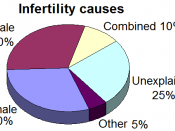The past two decades, especially of late, have seen a panoply of new techniques and advancements in the field of infertility; today, women already in menopause and in their 50's are getting the chance to beat the clock and become parents again. Beyond just in vitro fertilization, the world of infertility treatments has blossomed into treatments such as cytoplasmic transfer where the cytoplasm from a healthy donor egg is injected into an advanced "older" egg to boost its quality. Another experimental technique takes a donor egg and older woman's egg and removes both nucleuses; the older woman's nucleus is then injected into the donor's shell making a plausible three-parent baby! The article also discusses cryopreservation of not just eggs, but ovarian tissue which contains thousands of immature follicle eggs that endure the freezing process more successfully. Furthermore, for women who no longer have viable eggs, genetic research is now studying the gene associated with cell death in the ovaries.
So the technology is there, but what are the medical and psychological implications on not only parents, but children born to "older" parents? Doctors and researchers disagree: some believe menopause represents a evolutionary ominous sign to stop reproducing, while others want to test the limits of science. The children born of the 'infertility' generation might have some answers, but we will have to wait another decade to find out.
Personally, I found this article both stimulating and fascinating--technology proceeds at an alarming and exhilarating rate. Beyond the scope of out textbook, this article introduced more cutting-edge procedures for infertility and some of the ethical questions it garners. I would have liked a more comprehensive look into the psychological consequences of older-age pregnancies and how these parents are coping at specific ages.
Newman, J. (2000). How old is too old to...


